Yes, you really sound like that. No, I’m not kidding. Learning to love the sound of your own voice is key to gaining confidence in your speaking abilities. In this article, I give you the breakdown. Why you sound like that, the science behind it, and ways to overcome the hate of your own voice.
Most of us cringe when we hear the sound of our own voice on a recording. There is actually a term for it: voice confrontation. Long story short, you will always (I know, it sucks) sound differently on recordings and to other people than you do to yourself, due to air conduction and bone conduction (I’ll explain in a minute).
But are you sure I really sound like that? Yep. You do! Learning how to embrace it rather than cringing at it will not only help you speak better but learn to love yourself more. We all need a little bit of that… and by a little, I mean a lot.
Do you really sound like that?
Most of us cringe when hearing our own voice… am I right? But I don’t really sound like that do I? Yeah, you do. It’s called voice confrontation. The reason so many of us struggle with hearing ourselves on a recording is because we are so used to the sound of our voice when we talk. It sounds higher pitched and squeakier, not meeting our normal expectations.
The science behind it
Surprisingly, the reason why you sound differently in recordings is because of your bones. When speaking, the sound of your own voice travels to your ear directly from the bones in your skull. This is how most sound is perceived. In simple terms, bone conduction is basically the sound transferred through our bones, which creates a low frequency. So what you hear when you speak is going to sound not only deeper but also richer in tone. In reality, you aren’t actually completely aware of what you sound like when you are talking.
However, when hearing your voice on recordings the sound travels through the air, then to your ears. This is known as air conduction. The small bones in your ear and eardrum vibrate as a result of the sound. Because it does not travel through your skull, it is going to sound more high-pitched, and yes, cringeworthy.
How microphones affect the sound of your voice
Microphones obviously don’t have bones like humans do (oh, really?!). It is a machine. They don’t use bone conduction or air conduction (as described above). Microphones will alter the sound of your voice, some are going to be more accurate than others.
There is a lot that factors into choosing the right microphone for your podcast, of course, one that accurately depicts your voice. The type of recording equipment you use is going to change the quality of your voice, as well as how you use it. Microphone placement will affect the sound of your voice whether it’s the proximity, angle, or just your overall tone and volume. Microphone frequency response also plays a role in the way your recording will sound. Usually, you’ll want a flatter frequency response. It will capture your voice more accurately and you won’t sound like anyone but yourself.
Confronting your own voice: voice confrontation
Voice confrontation is a phenomenon of not liking the sound of your own voice. So many people, including myself, hate the sound of their own voice—especially on recordings. It is a new voice to your ears, revealing a difference between how you perceive yourself and then the reality. You analyze yourself differently, realizing that people see you so much differently than how you thought they did. It can be hard to overcome, which we’ll also get to.
You don’t want to sound like anyone else but yourself
Your voice is a part of self-identity.
This may seem to be a simple statement, but it is easy to forget. The voice you have, the way you speak, how much sound comes out of your mouth can reflect who you are as a person. Our voice plays a huge role in self-identity. Your voice is a fundamental part of who you are, how you express yourself every day. Through the tone and volume of how you speak, you can express your emotions. It indicates your mood, health, and even how tired you are.
We live in a world where everyone is constantly comparing themselves to others. We want the perfect body, the perfect hair, and the perfect house. But what about comparing your voice to others? With that, you don’t want to sound like anyone else but yourself. Trust me, I understand it is hard to feel confident when the voice we hear on recordings sounds so different from our own perspective. Learning to love yourself and how you sound is a great first step if you are nervous about starting a podcast.
Learn how to love the sound of your own voice
Learning to love the sound of your voice will not come to you overnight. It takes practice and patience. Self-esteem is something you will always continue to improve on, no matter what. The most important thing is to be yourself, this goes for everything. Do NOT let yourself care about what other people think or how they perceive you. It’s not going to change anything and honestly, will just make you feel like shit. My mom’s best advice to me was to not care. Yes, I still care. It’s hard not to. Confidence comes with just being yourself, and if anyone has anything to say about that, then screw them. With that said, here are a few tips & tricks that might help you overcome this insecurity:
Practice speaking
If it is with a partner, by yourself, in front of your dog—practice. It definitely helps if you have an audience so they can give you feedback, but even if it is just you in the mirror reciting your material, it makes a big difference. Practice makes perfect.
If you are being interviewed and have no idea what you’re going to say, grab a book from the shelf and read it out loud. It could be a children’s book, who cares. Make sure you have character, you are using good enunciation, and a confident tone of voice.
Exercises to help your speaking anxiety
Deep Breathing - Breathing exercises like diaphragmatic breathing help with anxiety, stress, and can even help you focus better. Pretend your stomach is a balloon. You want to fill the balloon, steady and slow. Then let the air out, again, steady and slow. Once you've practiced this enough, it'll be come a habit.
Write Down Affirmations - Things like "I am beautiful" or "I am fun" etc., will switch your mind from "ugh I will do terribly" or "I suck" to being more positive about yourself. This is an important tool to have if you struggle with being too hard on yourself, which is how most of us are. Even if it's manifestations like "I will speak confidently", I promise it will make a huge difference in your mindset.
Stretch - You build up so much tension in your muscles when you are nervous or stressed. Stretching out your arms, neck, shoulders, and whatever else you feel like needs it, will allow you to be more comfortable while speaking, and it will make your tone sound even better.
Focus on what you’re saying, not how it sounds
Having confidence in what you are saying will help tremendously with your speaking voice. People are most likely focusing on the words that come out of your mouth and digesting them. Speaking as though you know what you are talking about makes a huge difference in your tone of voice, and people are more likely to actually hear what you are saying.
Confidence in your words = confidence in your voice.
Writing what you want to talk about down first and practicing your rhythm helps too. Not going too fast or too slow is super important in getting your audience to understand what you’re saying. Speaking too fast makes any confidence in your voice go away, plus you may not be understood. Speaking too slow will make your audience zone out, think about what they’re having for dinner, whatever it is, they won’t be listening to what you have to say.
Learn to appreciate yourself as you are
Again, like I said above, stay true to yourself. You are the only you. Everything, including your voice, makes up who you are as a person. Everyone is special, everyone is different. Try not to compare yourself to others, no one can be you and you can’t be anyone else. Being confident with who you are can be so hard, I understand. Trust me. If you have to fake it til you make it, then do that. Write down things you love about yourself, having a dance party by yourself, whatever it may be that makes you feel good, do it. It is important to practice self-love for everyone, no matter what.
Conclusion
While you may be fixated on the sound of your voice, no one really pays attention to it. And if they do, like I said, screw ’em. You will always be you, express yourself however you want. At the end of the day, you are the only thing that matters. You are a badass. Speak up! Your voice means everything: emotions, thoughts, ideas. Embrace it!
So, even though we cringe at the high-pitched version of our voice we don’t recognize, it is likely people aren’t making the same evaluations as you are. But, with that said, we all need speaking practice. Our voice communicates how we feel, our confidence, and even the level of fatigue, regardless of what we’re saying. Practicing your tone of voice, what you are saying, and the way you are breathing will allow you to be stronger in your speaking and grow your confidence.
My advice to you: just be you, try being the best version of yourself every day, and throw a little “IDGAF” attitude in there somewhere too… it makes a difference in all aspects. I promise.












